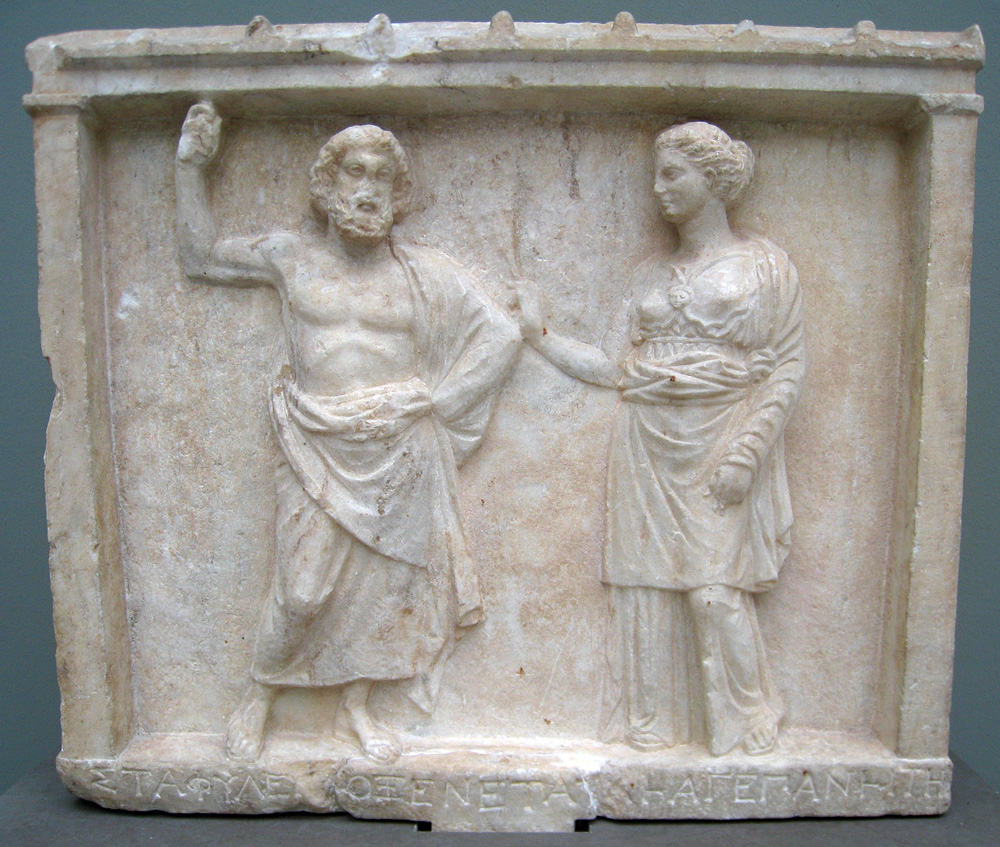Staphylus Athena on:
[Wikipedia]
[Google]
[Amazon]
 Staphylus (;
Staphylus (;
Online version at the Perseus Digital Library.Greek text available from the same website
*Nonnus, Nonnus of Panopolis, ''Dionysiaca'' translated by William Henry Denham Rouse (1863-1950), from the Loeb Classical Library, Cambridge, MA, Harvard University Press, 1940.
Online version at the Topos Text Project.
* Nonnus of Panopolis, ''Dionysiaca. 3 Vols.'' W.H.D. Rouse. Cambridge, MA., Harvard University Press; London, William Heinemann, Ltd. 1940–1942
Greek text available at the Perseus Digital Library
* Pliny the Elder, ''Natural History (Pliny), The Natural History.'' John Bostock, M.D., F.R.S. H.T. Riley, Esq., B.A. London. Taylor and Francis, Red Lion Court, Fleet Street. 1855
Online version at the Perseus Digital Library.
* Pliny the Elder, ''Naturalis Historia.'' Karl Friedrich Theodor Mayhoff. Lipsiae. Teubner. 1906
Latin text available at the Perseus Digital Library.
{{Greek myth index Children of Dionysus Demigods in classical mythology Dionysus in mythology LGBT themes in Greek mythology
 Staphylus (;
Staphylus (; Ancient Greek
Ancient Greek includes the forms of the Greek language used in ancient Greece and the ancient world from around 1500 BC to 300 BC. It is often roughly divided into the following periods: Mycenaean Greek (), Dark Ages (), the Archaic peri ...
: Στάφυλος "grape cluster") is one of several personages of ancient Greek mythology, almost always associated with grapes or wine
Wine is an alcoholic drink typically made from fermented grapes. Yeast consumes the sugar in the grapes and converts it to ethanol and carbon dioxide, releasing heat in the process. Different varieties of grapes and strains of yeasts are m ...
:
*Staphylus
Staphylus (; Ancient Greek: Στάφυλος "grape cluster") is one of several personages of ancient Greek mythology, almost always associated with grapes or wine:
* Staphylus, son of wine-god Dionysus and Ariadne.
* Staphylus, beloved of Diony ...
, son of wine-god Dionysus
In ancient Greek religion and myth, Dionysus (; grc, Διόνυσος ) is the god of the grape-harvest, winemaking, orchards and fruit, vegetation, fertility, insanity, ritual madness, religious ecstasy, festivity, and theatre. The Romans ...
and Ariadne.
* Staphylus, beloved of Dionysus, from the island of Thasos. It is thanks to Dionysus' love for him that Thasian wine is distinguished.
* Staphylus, in a reconstructed myth, the son of Dionysus, Bacchus and Erigone (daughter of Icarius), Erigone, where Bacchus assumed the form of a grape which Erigone ate. She immediately realized that she was with child and in time gave birth to a son whom she named Staphylus.
* Staphylus, husband of Methe and father of Botrys (mythology), Botrys. The family held court in their palace at Assyria. They received Dionysus as guest and held a banquet in his honor. Staphylus died a sudden death the next morning after the feast; to console his wife and son, Dionysus named grape bunches after Staphylus, drunkenness after Methe, and grapes after Botrys.
* Staphylus, son of Oenomaus, who fought on Dionysus' side against Poseidon in the conflict of the two gods concerning Beroe (mythology), Beroe.
* Staphylus, son of Silenus, who introduced the practice of mixing wine with water.
* Staphylus, goatherd of King Oeneus, who discovered wild grapes as he was pasturing the king's goats and saw one of them chewing on the plant. He presented it to Oeneus, who in his turn invented the way of making the grapes into a drink. When Dionysus visited Oeneus, the king served him the new drink. Dionysus suggested that the drink be named ''oinos'' (wine) after Oeneus, and the grapes ''staphyloi'' after the goatherd Staphylus.Marcus Valerius Probus, Probus on Virgil, ''Georgics'' 1.9
See also
* Rhoeo * StaphylococcusNotes
References
* Bibliotheca (Pseudo-Apollodorus), Apollodorus, ''The Library'' with an English Translation by Sir James George Frazer, F.B.A., F.R.S. in 2 Volumes, Cambridge, MA, Harvard University Press; London, William Heinemann Ltd. 1921.Online version at the Perseus Digital Library.
*Nonnus, Nonnus of Panopolis, ''Dionysiaca'' translated by William Henry Denham Rouse (1863-1950), from the Loeb Classical Library, Cambridge, MA, Harvard University Press, 1940.
Online version at the Topos Text Project.
* Nonnus of Panopolis, ''Dionysiaca. 3 Vols.'' W.H.D. Rouse. Cambridge, MA., Harvard University Press; London, William Heinemann, Ltd. 1940–1942
Greek text available at the Perseus Digital Library
* Pliny the Elder, ''Natural History (Pliny), The Natural History.'' John Bostock, M.D., F.R.S. H.T. Riley, Esq., B.A. London. Taylor and Francis, Red Lion Court, Fleet Street. 1855
Online version at the Perseus Digital Library.
* Pliny the Elder, ''Naturalis Historia.'' Karl Friedrich Theodor Mayhoff. Lipsiae. Teubner. 1906
Latin text available at the Perseus Digital Library.
{{Greek myth index Children of Dionysus Demigods in classical mythology Dionysus in mythology LGBT themes in Greek mythology